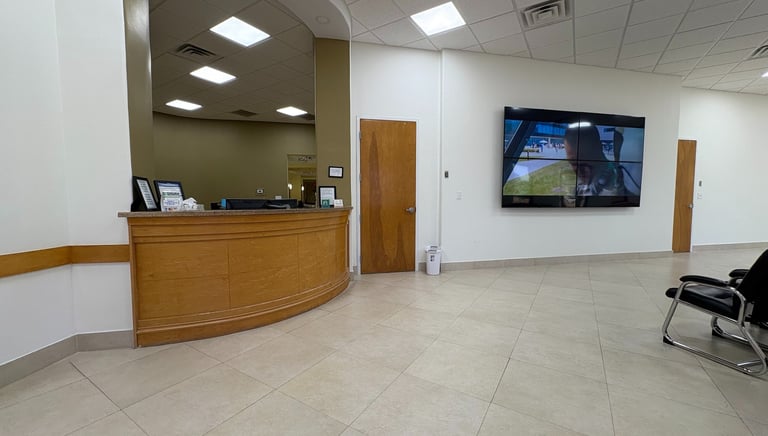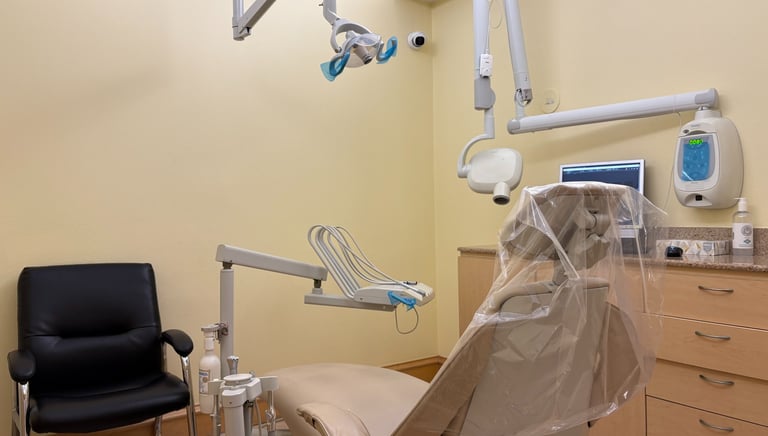Call (956) 928-0022 Mon-Thurs: 9am-6pm/Friday 9am-5pm
Patient Information
Scheduling
Appointments can be scheduled Monday through Friday. Please call the office for exact hours of operation, as hours vary throughout the year.
If you have an urgent need for endodontic care, we will see you as quickly as possible. Because we do need to respond to emergencies, we occasionally have to interrupt our regular schedule of appointments. We regret any delays and inconveniences this may cause.
Before Root Canal Therapy
Please eat a full breakfast or lunch as applicable. Also, if you have been advised by your physician or dentist to use antibiotic pre-medication because of mitral valve prolapse (MVP), heart murmur, hip or cardiac prosthesis, or rheumatic heart disease, please call our office for instructions before the day of your scheduled visit. Please bring a list of all medications you are taking. At each visit to our office, report any changes in your health status.
Bring all referral information in your possession (referral note, x-ray films, etc.) to the initial visit.
If radiographs have been forwarded to our office, please confirm our receipt.
If you anticipate using nitrous oxide (laughing gas) sedation please advise us in advance.
All patients under the age of 18 must be accompanied by a parent or guardian.
After Root Canal Therapy
Refrain from eating until the anesthesia has worn off to prevent possible injury to your lips and cheeks. This time interval will also allow the temporary filling to set to a reasonable hardness.
Any infection or inflammation that was present in your tooth has been eliminated. The canal(s), have been sealed. Nature must now have time to repair any damage that may have occurred.
The tooth may be tender for quite some time. Be sure to take any antibiotic medication prescribed for you as it will help the area to heal. An analgesic may also be recommended for your comfort and can be taken as directed.
DO NOT CHEW ON THE TOOTH UNTIL ALL OF THE TENDERNESS IS GONE. The tooth will be sore to chewing and bite pressure so you should avoid hard or chewy foods. This should gradually decrease within 7-10 days after treatment.
Although the root(s) are permanently sealed, the outer surface is only sealed with a "temporary" filling. It may last for many weeks, but it is advisable to see your regular dentist as soon as you can to restore the tooth. A permanent restoration (such as a crown) will give the tooth more protection.
When Root Canal Treatment is Done in 2 Visits
Your root canal has been started and much of the difficult work is accomplished. We still need to see you again to complete treatment. You may experience some discomfort after the first treatment. The tooth and its surrounding tissues may have been irritated by the inflammation that was present in the pulp (nerve). The manipulation of the tooth and its supporting tissues during treatment may also produce irritation. If you have been instructed to start an antibiotic, please do so at once and finish the entire prescription.
When swelling exists it takes about 72 hours for the antibiotics to become effective. The swelling generally will not start to subside for at least 72 hours. Swelling may be reduced by placing cold (ice) packs to the outer surface of the face in the area treated. Keep cold pack in place 10 minutes and then repeat 10 minutes later.
Rinsing your mouth with warm salt water solutions will help speed the healing process by stimulating circulation. Use 1/2 teaspoon of ordinary table salt to one glass of warm water. Repeat rinsing several times each hour while tooth is uncomfortable.
If pain is not relieved after medication or seems to increase rather than decrease please call the office for further instructions. Try not to use the tooth in chewing, until after the tooth is restored by your general dentist. This will prevent fracturing the tooth. Give nature time to help the healing.
It is very important to keep your final appointment so the root canals can be filled and sealed permanently.
Financial Information
Payment is due at the time services are rendered. Our office staff will go over endodontic fees and the office payment policy at the time you schedule your appointment. For your convenience, we accept Visa, Master Card, Discover, American Express, Care Credit and personal checks. Care Credit offers no interest payment plans within specified time periods to qualified applicants.
INSURANCE
When treatment is completed, we will be happy to assist you in filing your insurance claim. Dental insurance is a separate contract and private arrangement between you and the insurance company. Payment for services rendered is your personal responsibility regardless of the amount of reimbursement you receive from your insurance carrier.
Pre-Surgery Information (Applies to Surgical Treatments Only)
In order to obtain the desired result from therapy and minimize swelling and discomfort, please follow these instructions:
DO NOT take aspirin or non-steroidal anti-flammatory drugs (Advil, Ibuprofen, Motrin, Aleve, Dolobid, etc.) for one (1) week prior to surgery. These drugs prolong bleeding and potentiate swelling.
If your medical doctor has prescribed any of the above medications or any anticoagulants, please let us know so that we may discuss it with your MD.
Remember to have a light meal e.g. breakfast if surgery is in the morning or lunch if in the afternoon. This is especially important for those patients who have low blood sugar, are on diabetic medication or have been dieting.
Avoid coffee, tea or other beverages containing caffeine the entire day of surgery.
Avoid alcoholic beverages for at least 2 days before and 4 days after surgery. Alcohol dilates blood vessels, which may result in bleeding, swelling and/or pain.
Do not wear contact lenses to your surgical appointment.
Wear loose comfortable clothing. Do not use makeup.
Take all prescribed medications as directed. Antibiotics, unless advised otherwise, are normally taken with a full glass of water on an empty stomach 1/2-1 hour before meals or 2 or more hours after eating. Pain medication should be taken with food to minimize nausea. Do not drive or operate dangerous machinery, while under the influence of prescription pain medication e.g. codeine, narcotics, etc.
Good oral hygiene promotes healing. Ensure that you have brushed and flossed your teeth prior to your surgical visit. If your gums bleed or you have difficulty flossing the area please arrange for your dentist to clean your teeth prior to surgery.
It is recommended (but not essential) that someone accompanies you to the surgical visit to assist with transportation home afterwards.
Make sure you have a reusable ice pack and anti-bacterial mouthwash (Listerine etc.) available for use after surgery
Post-Surgery Information
To Control Swelling
Try to keep your mouth at rest for the remainder of the day. Upon reaching home, place an ice pack or frozen moistened washcloths over the affected area 10 minutes on and 10 minutes off and repeat for the balance of the day. As ice prevents swelling but does not reduce it, apply it as soon as possible after the surgery. Do not continue using the ice pack after the day of surgery.
Keep the inside of your mouth cold with ice water or chipped ice for the rest of the day.
Avoid hot foods or drinks e.g. soup, coffee etc. and do not place heat on the side of your face.
Keep your head elevated the first two nights after surgery by sleeping on two pillows.
To Control Bleeding
Do not rinse for 4-6 hours after surgery.
Avoid medications that promote excessive bleeding e.g. aspirin, anticoagulants.
Avoid strenuous exercise for 2-3 days.
Should bleeding occur, place a small, moist, folded gauze or a slightly moist tea bag over the area and apply light pressure for approximately 20 minutes. Repeat if necessary.
To Control Pain
Discomfort may be more severe especially if surgery has been extensive. Two hours after surgery take 2 ibuprofen (Advil) plus 1 extra-strength Tylenol and repeat every 4 hours for 48 hours. If you cannot take ibuprofen, take two extra-strength Tylenol every 4 hours for 48 hours.
If this regimen does not relieve the discomfort, please fill the prescription given to you or call the office.
Diet
A cold liquid diet is recommended for the balance of the day (e.g. milkshakes, ice-cream, yogurt, nutriment, instant breakfast etc.) Avoid hot food and drink.
The day after surgery gradually resume your normal diet starting with soft foods e.g. scrambled eggs, cottage cheese, fish, Jell-O etc. Avoid foods that are hard, hot, spicy or salty.
Limit alcohol intake and smoking for at least 48 hours to aid the healing process.
Oral Hygiene
It is important to keep your mouth clean. Brush and floss those teeth where surgery was not performed. DO NOT BRUSH in the surgical area.
Rinse gently starting before bedtime the day of surgery. Thereafter, rinse twice a day with a teaspoon of salt in a glass of warm water for 30 seconds and twice per day with an anti-bacterial mouthwash (e.g. Listerine) for 30 seconds.
General Information
Some swelling and discoloration of the face with restricted jaw movement are expected after surgery, especially on the second and third days. This should disappear in about 3-5 days. In some cases a biopsy may be taken of the infected tissue and sent to an oral pathology laboratory for examination. Any additional fees for this service will be billed directly to you by the laboratory. If any problem or question should arise, please call our office.



